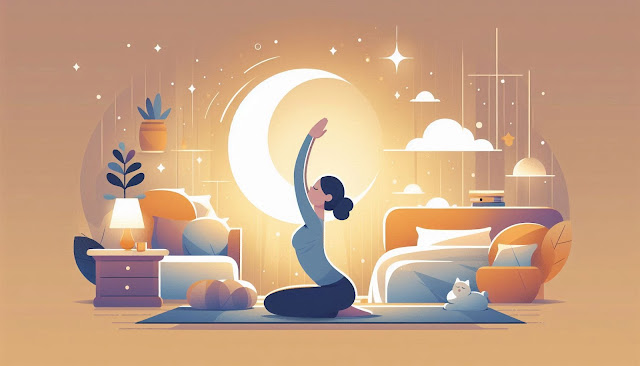Sleep problems are becoming increasingly common in today’s fast-paced world. From insomnia and stress-induced sleep disorders to poor sleep quality, millions of people struggle to get the rest they need. With the rise in sleep-related health issues, more individuals are seeking natural solutions.
One of the most effective and time-tested methods for improving sleep quality is yoga. This ancient practice has been linked to enhanced relaxation, reduced stress, and better overall sleep patterns. But how exactly does yoga influence sleep? Can simple stretches and breathing exercises help you fall asleep faster and stay asleep longer?
In this article, we’ll explore the impact of yoga on sleep quality, backed by scientific research and real-life experiences.
The Science Behind Yoga and Sleep
Yoga is more than just a physical workout; it has deep-rooted benefits for mental and emotional well-being. When practiced regularly, yoga has a profound effect on the nervous system, promoting a state of relaxation that is essential for deep sleep.
How Yoga Affects the Nervous System
Yoga stimulates the parasympathetic nervous system, often referred to as the “rest and digest” system. This activation helps lower heart rate, reduce blood pressure, and prepare the body for sleep.
The Role of Yoga in Reducing Stress and Anxiety
Stress and anxiety are two of the biggest culprits behind poor sleep. Yoga incorporates deep breathing, mindfulness, and physical relaxation, which collectively work to lower cortisol levels—the primary stress hormone.
Studies Proving the Connection Between Yoga and Better Sleep
Multiple studies have confirmed that yoga practitioners experience improved sleep efficiency, reduced sleep latency (the time it takes to fall asleep), and fewer nighttime awakenings.
How Yoga Helps with Insomnia
Understanding Insomnia and Its Causes
Insomnia is a condition where individuals struggle to fall asleep or stay asleep. It can be caused by stress, anxiety, lifestyle habits, or even hormonal imbalances.
The Impact of Yoga on Sleep Latency and Sleep Efficiency
Research suggests that practicing yoga before bed can significantly reduce the time it takes to fall asleep and increase overall sleep efficiency.
Case Studies on Yoga for Treating Insomnia
A 2019 study published in the Journal of Sleep Research found that individuals who practiced yoga for eight weeks experienced significant improvements in their sleep quality and overall well-being.
The Role of Yoga in Reducing Stress and Anxiety for Better Sleep
Stress triggers a cycle of overthinking and restlessness, making it difficult to fall asleep. Yoga combats this by promoting mindfulness and relaxation.
How Stress Disrupts Sleep Patterns
When the body is in a constant state of stress, the production of sleep-inducing hormones like melatonin is disrupted.
The Impact of Deep Breathing and Mindfulness
Yoga emphasizes deep, rhythmic breathing, which slows down the heart rate and activates the body’s relaxation response.
How Yoga Calms the Nervous System
Regular yoga practice helps the body switch from the “fight or flight” mode (sympathetic nervous system) to a calm and restful state (parasympathetic nervous system).
The Best Types of Yoga for Sleep Improvement
Not all yoga styles are equally beneficial for sleep. Some are energizing, while others are calming.
Hatha Yoga: The Gentle Approach to Relaxation
Hatha yoga involves slow movements and gentle postures that promote physical and mental relaxation.
Yin Yoga: Deep Stretching for Stress Release
Yin yoga involves holding poses for longer durations, targeting deep connective tissues and promoting full-body relaxation.
Restorative Yoga: The Ultimate Relaxation Technique
This form of yoga uses props like bolsters and blankets to support the body in restful positions, allowing deep relaxation.
Yoga Poses That Help You Sleep Faster
Certain yoga poses are particularly effective at relaxing the body and preparing it for sleep.
- Child’s Pose (Balasana): Helps relieve tension in the back and mind.
- Legs-Up-The-Wall Pose (Viparita Karani): Improves blood circulation and calms the nervous system.
- Reclining Butterfly Pose (Supta Baddha Konasana): Opens the hips and promotes deep relaxation.
Conclusion
Yoga is a natural, effective way to improve sleep quality. Through mindful movement, deep breathing, and relaxation techniques, yoga helps the body transition into a restful state. Whether you struggle with insomnia, stress, or general restlessness, incorporating yoga into your nightly routine can be a game-changer.
By practicing yoga consistently, you’ll not only sleep better but also wake up feeling more refreshed and energized. So, why not start tonight?
FAQs
1. How long should I do yoga before bed to improve sleep?
A 20-30 minute gentle yoga session is ideal for better sleep.
2. Can yoga completely cure insomnia?
While yoga can significantly improve sleep, it should be combined with good sleep hygiene practices for the best results.
3. Is morning yoga also beneficial for sleep?
Yes, but evening yoga is more effective for relaxation and preparing the body for sleep.
4. Can beginners do yoga for sleep?
Absolutely! Simple poses and breathing exercises are perfect for beginners.
5. How soon will I see results from yoga for sleep?
Some people notice improvements immediately, while for others, it may take a few weeks of consistent practice.

